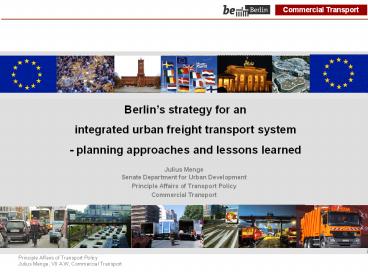Julius Menge Senate Department for Urban Development - PowerPoint PPT Presentation
1 / 11
Title:
Julius Menge Senate Department for Urban Development
Description:
Berlin s strategy for an integrated urban freight transport system - planning approaches and lessons learned Julius Menge Senate Department for Urban Development – PowerPoint PPT presentation
Number of Views:140
Avg rating:3.0/5.0
Title: Julius Menge Senate Department for Urban Development
1
Berlins strategy for an integrated urban
freight transport system - planning approaches
and lessons learned
- Julius MengeSenate Department for Urban
Development - Principle Affairs of Transport Policy
- Commercial Transport
2
Berlin at a glance - some key facts
area 892 km²
inhabitants 3,4 million
48 car-free households
car ownership 317 cars/1.000 inhab.
employees 1.664.100 (2009)
GDP 87,5 EUR bn. (2008)
rate of unemployment 14.2 (2010)
12 boroughs
3
Berlin a Polycentric City
Historical Centre
City West
4
Berlin is different
- Excellent infrastructure for freight transport
- - Road
- - Rail
- - Inner City Harbours
- - Intermodal Hubs
- Excellent road infrastructure and capacities
- Excellent data quality
- - Infrastructure
- - Effects
- ...but Considerable Transport Induced Problems
- air quality (PM10, PM2.5, national NO2
ceiling,) - climate protection (Berlins aim 40 overall
reduction until 2020, though missing specific
objectives for transport sector) - noise (Berlins ambient noise directive)
5
Freight transport related activities (1991-2002)
many lessons to learn...
- 1991 Freight terminals (Güterverkehrszentren,
GVZ) - 1992 Construction logistics
- 1992 Establishment of the division Commercial
Transport (to 2004) - 1994 Initialization of the platforms commercial
transport - 1993 Combined lanes for busses and lorries
- 1995 Establishment of loading zones
- 1995 Concept of urban small-scale freight
terminals (Güterverkehrssubzentren, GVSZ) - 1997/2000/2003 Integrated Urban Transport Plan
(StEP Verkehr) - 1999 Traffic Management Centre Berlin
(Verkehrsmanagementzentrale, VMZ) - 1999 Transport Technology System Network (FAV)
- 2000 Truck routing network Berlin
(Lkw-Routennetz) - 2001 CNG-introduction (stations vehicles)
- 2001 CIVITAS TELLUS
- 2002 Study urban rail infrastructure
- 2002 Berlins harbour concept
- 2002 EU project HEAVEN (Healthier Environment
through Abatement of Vehicle Emissions and Noise)
6
Berlins Integrated Urban Freight Transportation
Strategy
- adopted by the
- House of Representatives Feb. 2006
- Main action fields
- field 1 privileges for urban freight transport
- field 2 conservation of necessary urban rail
infrastructure and logistic fields - field 3 transport efficient planning and
settlement - field 4 installation of a regional urban
freight platform - field 5 improvement of transport efficiency
7
Berlins Integrated Urban Freight Transportation
Strategy working approach and process ...
- Participatory planning process
- Different Stakeholders (all transport modes,
LSPs, chamber of commerce, various interest
groups, boroughs) - Supported by research
- Five common working sessions
- Based on current situation and infrastructure,
supported by various studies - Clear responsibilities
- Frequent evaluation and report
- Commercial transport instead of pure freight
8
How to plan for freight transport?
- An integrated approach is needed(not only all
transport modes, but all relevant strategic plans
and stakeholders) - Sufficient data (comparable, frequent data on
local level, all transport modes incl. status of
the infrastructure) - Clear responsibilities
- Partners for the process (policy makers, local
decision makers, local economy, citizens) - Pressure and (political) will to act
- Money and non-financial support? EU projects
Mobility and Traffic Management (new)
9
EU Project CityLog the approach
- Project aim
- Seek and establish new logistic concepts for
inner urban areas - Reduce the impact of urban freight transport
- Approach efficient resource planning (usings
telematics and ITS), innovative logistic
solutions (new container or box solutions), use
of green vehicle (EEV) - Partners Centro Ricerche FIAT (CRF), IVECO,
Volvo, TNT, NAVTEQ, PTV, ... - Berlin is one of three locations (Berlin,
Communauté Urbaine de Lyon, Regione Piemonte),
where the innovations will be put in to practice
and real life
10
CityLog What can we learn as a city?
- Urban demonstration area to locally evaluate
impacts - Test possible combinations with specific local
regulations (e.g. loading zones, infrastructure
on public ground, temporal advantages for clean
vehicles) - Transferability (spatial to other concepts or
suppliers) - Estimate impact for the city, based on (detailed)
process data - Link to other EU projects (e.g. CityMove)
11
- Thank you! Mercí! Danke!
- Julius MengeSenate Department for Urban
DevelopmentPrinciple Affairs of Transport
PolicyCommercial TransportAm Köllnischen Park
3, 10173 BerlinTel. 49 (0)30 9025 - 1566Fax.
49 (0)30 9025 - 1675e-mail julius.menge_at_senstad
t.berlin.de































